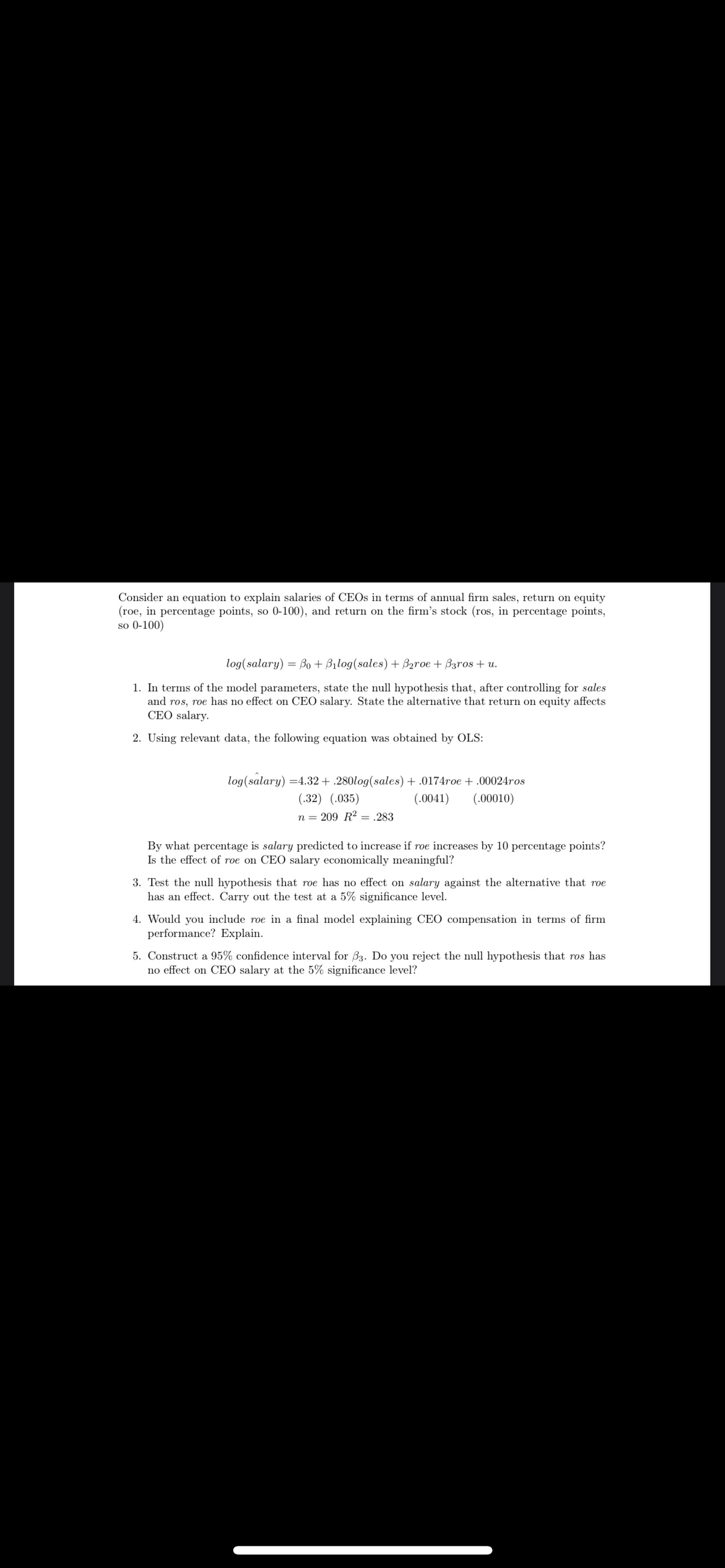Consider an equation to explain salaries of CEOS in terms of annual firm sales, return on equity (roe, in percetage points, so 0-100), and return on the firm's stock (ros, in percentage points, so 0-100) log(salary) = Bo + Bilog(sales) + B2roe + Bzros + u. 1. In terms of the model parameters, state the null hypothesis that, after controlling for sales and ros, roe has no effect on CEO salary. State the alternative that return on equity affects CEO salary. 2. Using relevant data, the following equation was obtained by OLS: log(salary) =4.32 + .280log(sales) + .0174roe + .00024ros (.32) (.035) (.0041) (.00010)
Consider an equation to explain salaries of CEOS in terms of annual firm sales, return on equity (roe, in percetage points, so 0-100), and return on the firm's stock (ros, in percentage points, so 0-100) log(salary) = Bo + Bilog(sales) + B2roe + Bzros + u. 1. In terms of the model parameters, state the null hypothesis that, after controlling for sales and ros, roe has no effect on CEO salary. State the alternative that return on equity affects CEO salary. 2. Using relevant data, the following equation was obtained by OLS: log(salary) =4.32 + .280log(sales) + .0174roe + .00024ros (.32) (.035) (.0041) (.00010)
Linear Algebra: A Modern Introduction
4th Edition
ISBN:9781285463247
Author:David Poole
Publisher:David Poole
Chapter4: Eigenvalues And Eigenvectors
Section4.6: Applications And The Perron-frobenius Theorem
Problem 70EQ
Related questions
Question
Just number 4 please. Thankyou

Transcribed Image Text:Consider an equation to explain salaries of CEOS in terms of annual firm sales, return on equity
(roe, in percentage points, so 0-100), and return on the firm's stock (ros, in percentage points,
so 0-100)
log(salary)
Bo + Bilog(sales) + Baroe + B3ros + u.
1. In terms of the model parameters, state the null hypothesis that, after controlling for sales
and ros, roe has no effect on CEO salary. State the alternative that return on equity affects
CEO salary.
2. Using relevant data, the following equation was obtained by OLS:
log(salary) =4.32 + .280log(sales) + .0174roe + .00024ros
(.32) (.035)
(.0041)
(.00010)
n = 209 R2 = .283
By what percentage is salary predicted to increase if roe increases by 10 percentage points?
Is the effect of roe on CEO salary economically meaningful?
3. Test the null hypothesis that roe has no effect on salary against the alternative that roe
has an effect. Carry out the test at a 5% significance level.
4. Would you include roe in a final model explaining CEO compensation in terms of firm
performance? Explain.
5. Construct a 95% confidence interval for B3. Do you reject the null hypothesis that ros has
no effect on CEO salary at the 5% significance level?
Expert Solution
This question has been solved!
Explore an expertly crafted, step-by-step solution for a thorough understanding of key concepts.
This is a popular solution!
Trending now
This is a popular solution!
Step by step
Solved in 2 steps with 2 images

Recommended textbooks for you

Linear Algebra: A Modern Introduction
Algebra
ISBN:
9781285463247
Author:
David Poole
Publisher:
Cengage Learning

College Algebra (MindTap Course List)
Algebra
ISBN:
9781305652231
Author:
R. David Gustafson, Jeff Hughes
Publisher:
Cengage Learning

Trigonometry (MindTap Course List)
Trigonometry
ISBN:
9781337278461
Author:
Ron Larson
Publisher:
Cengage Learning

Linear Algebra: A Modern Introduction
Algebra
ISBN:
9781285463247
Author:
David Poole
Publisher:
Cengage Learning

College Algebra (MindTap Course List)
Algebra
ISBN:
9781305652231
Author:
R. David Gustafson, Jeff Hughes
Publisher:
Cengage Learning

Trigonometry (MindTap Course List)
Trigonometry
ISBN:
9781337278461
Author:
Ron Larson
Publisher:
Cengage Learning